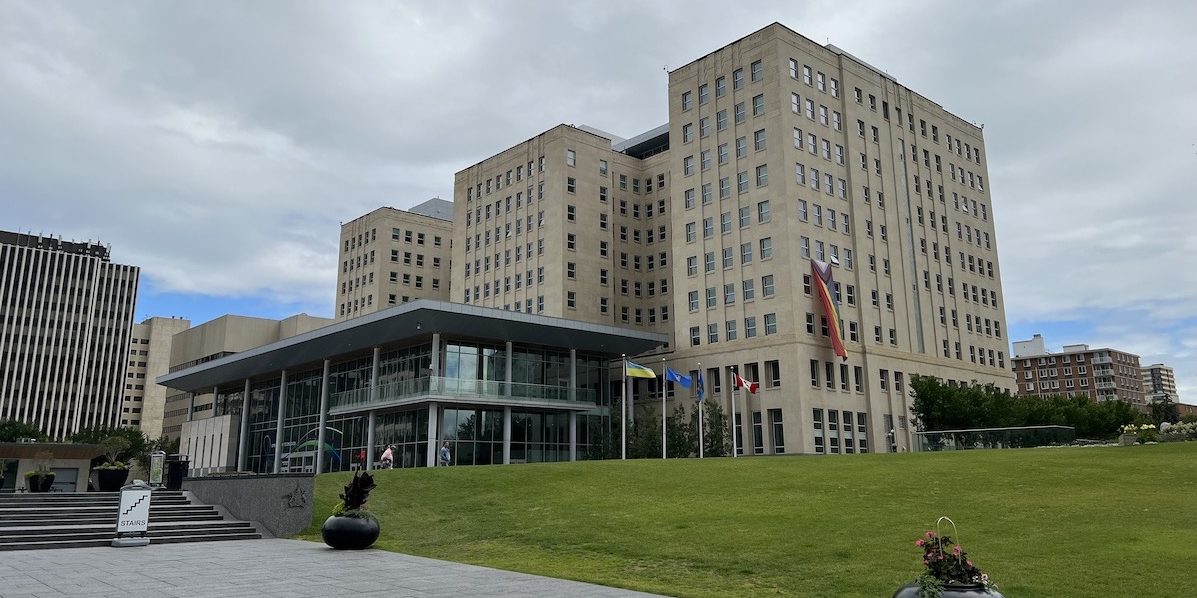Yesterday, the provincially owned Federal Building adjacent to the Alberta Legislature in downtown Edmonton was officially renamed the Queen Elizabeth II Building.
“Queen Elizabeth II served Albertans as our head of state for seven decades,” said Premier Jason Kenney, after whom for a variety of reasons an Alberta Government building is unlikely ever to be named, stating the obvious.
“Renaming the Federal Building is a fitting tribute to this remarkable lady, whose name will inspire generations to come,” said Kenney, who will only be the premier of Alberta for a few more days, in an unusually anodyne press release for his United Conservative Party (UCP) government.
That may or may not be the case, but the new name will certainly end considerable confusion about a provincial building known as a federal building, and for that reason alone the change will probably be painlessly adopted by Albertans without the controversy normal in such situations.
Naming it after the late Queen also solves a problem for a government that has spent most of its term in office angry at almost everybody, which would have made it difficult to find someone closer to home, dead or alive, after whom it could be named.
“Rooms in the building’s 10th floor were named to honour the Royal Family, including the Windsor Room,” the press release continued, failing for some reason to mention that the notorious Sky Palace perches atop the QE2B.
The Sky Palace, as it is popularly known, was originally intended to serve as an Edmonton residence for Premier Alison Redford and more recently has been used as an entertainment and dining venue for Kenney, senior UCP cabinet members, and their political aides.
Speaking of changing names, much fun was had yesterday at the expense of the B.C. Liberals, now that they have decided they are Liberal no more.
In reality, of course, the Opposition party in the province to the west of us never was liberal in anything but name.
They have now opted to call themselves B.C. United – which, as many people here in Alberta observed, sounds like a soccer club in a country where that game is called football.
B.C.’s Liberals are, in fact, the 1990s version of what we used to call the Social Credit coalition, which as any good Socred would tell you, and several of them did tell me over the years, was not social credit at all.
That is to say, unlike their Alberta contemporaries, B.C. Social Credit under the Bennetts, William and Bill, pere et fils, were just conservatives, not kooky monetary reformers.
The B.C. Liberals, who took over for them in much the same coalition role, were neoliberals – although it may not have occurred to them to have rebranded themselves as either the B.C. Neoliberal Party or the B.C. Not-the-Liberals when they decided to put some rhetorical distance between themselves and the Liberals in Ottawa, who are apparently not neoliberal enough to suit the neoliberals of the west.
They could also hardly call themselves the Not The B.C. NDP Party, never mind the apparent redundancies, which is the actual purpose of their coalition, without reminding voters in that province who has been running the place since 2017, with a little temporary assistance from the B.C. Greens.
Or maybe they did consider all those names. Who knows? The CBC said only that the party considered more than 2,000 names, which may explain why it took them so long, since there’s been nothing particularly liberal about them since Gordon Campbell took over the party in 1993.
However, the B.C. Liberals-no-longer seem not to have considered the dangers of protesting too much by calling their party united, as is certainly the case of our ironically disunited United Conservative Party in Alberta.
“Are they giving up politics and becoming a soccer franchise?” wondered journalist Max Fawcett, one of the great wits of the 21st Century.
This prompted me to recall that the previous united party to rule this province – the United Farmers of Alberta – did give up politics when they were defeated in 1935 by William Aberhart’s Social Credit, which was considerably closer to the real thing than William Andrew Cecil Bennett’s faux conservatives ever were.
But there is potential redemption in the UFA story for both the UCP and B.C. United, which I suppose will inevitably come to be known as BCU, which sounds like a university.
As the always helpful Wikipedia explains: “Following the dissolution of its political wing, UFA focused on its commercial operations. UFA entered into a partnership with Maple Leaf Fuels, a subsidiary of Imperial Oil in 1935 to distribute fuel to its members.”
To this day, UFA distributes gasoline and diesel throughout Alberta.
What better future could one imagine for B.C.’s united neoliberals or their similarly united Alberta counterparts than to continue onward, honourably, as a chain of automotive electrical charging stations?



